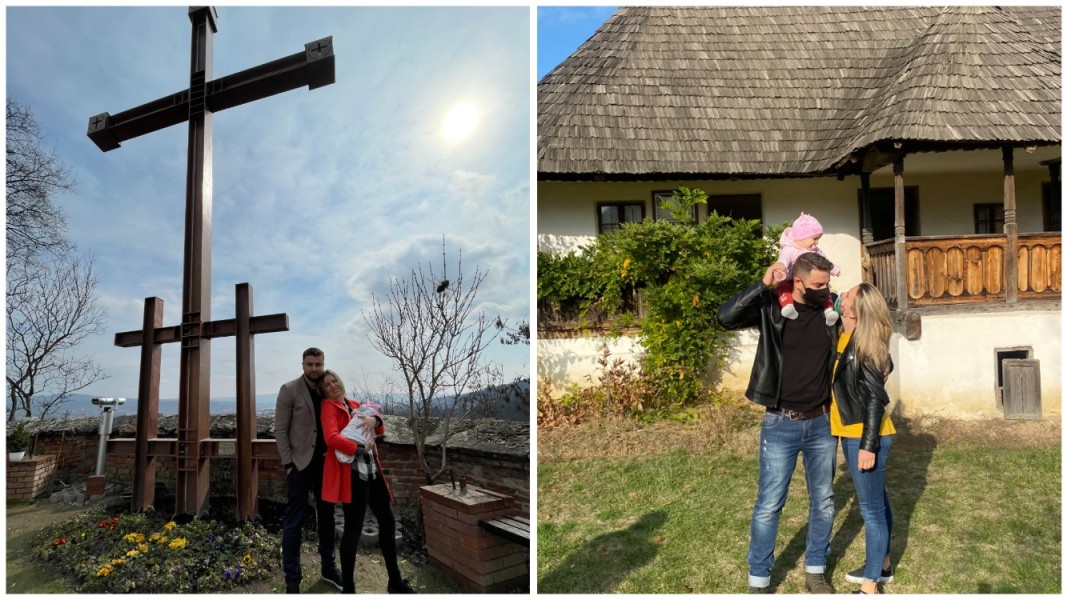Building your life in a new and different country is always a challenge. It is even greater for a woman who is forced to find herself in a similar situation with her children. Something thousands of Ukrainian women have been facing since February 24. "What is happening in a country like Ukraine in the 21st century is unacceptable," says Gabriela Peloiu, a 30-year-old Bulgarian who has lived with her family in Râmnicu Vâlcea, Romania, for two years. According to her, in the first week since the start of the war, more than 10,000 Ukrainians have entered Romania, most of whom have already left. "We are quite far from the Ukrainian border and there is not so much fear here, but everyone comments on what is happening. None of the people I know support Russia's military attacks. People are scared, but moderately so. There is no panic," says Gabriela. She is adamant that the Romanian state is helping all Ukrainians as much as it can.
Gabriela herself knows how difficult it is to start your life from scratch - she has done it twice. With the difference that it was at her own will and she had the right to choose.
She lived with her husband in the UK for almost six years, but when they decided to start a family, neither the United Kingdom nor Bulgaria felt like the right places for this step:
"It would be extremely difficult for us in England, because maternity leave is only 9 months there. We had no relatives to help us. So we decided to come to his homeland - Romania. We had an idea to open a business that we created and it worked very well. It would be very difficult for my husband to start working in Bulgaria without knowing the language, which is also very difficult to learn. And here we are not very far from my relatives and we often travel to Bulgaria."
Gabriela says the social conditions for young parents in Romania are very good. Like in Bulgaria, maternity leave is two years, but unlike her homeland, the maternity benefits do not change throughout the period. There were, of course, difficulties for her. Although many Bulgarians live in Romania, they are mostly in Bucharest and Constanta. In the town where she lives, Ramnicu Valcea, it turned out that there was only one more Bulgarian.
"While I was pregnant, I had a lot of questions about motherhood and raising a newborn, but I couldn't find any information in Romania."

So, on the threshold of the most important role in her life - that of a mother, Gabriela created in 2020 the Facebook group "BG Moms in Romania". Today it has more than 250 members who help each other with various useful information. There are also Romanians in the group who are interested in or directly related to Bulgarian society.
Still, Gabriela admits: "Here the Bulgarians are not so close, united and as if they have merged with the Romanians." And the reason, according to her, is that we are quite close in mentality and way of life.
Gabriela says Romanians are rather traditionalists, they respect their national and religious customs more, strictly observe the church holidays and care a lot for their families. As for their attitude towards women, it is similar to that in Bulgaria - they try to be a little more modern, but there is still something to be desired, says Gabriela with a smile.
And today, she will celebrate the Day of Women, March 8, for the second time in her life as a mother.
"Even before I had a child, I always thought it was a mother's day, not a woman's day. The holiday in Romania is celebrated as in Bulgaria - with the gift of flowers. Similarly, on March 1, martenitsas are also given here, with the exception that they are given only to women, not to men, as it is believed to be a symbol of fertility. However, I put amartenitsa on my husband according to the Bulgarian custom for health. "
And to all Bulgarian women who have taken on the role of mothers, far from home, Gabriela wishes above all a lot of strength and patience.
English version Rositsa Petkova
Photos: private libraryThere are many Bulgarian schools in the United States, with the oldest one founded by the Bulgarian diaspora in Chicago. In addition to the well-known Sunday schools, there are many other forms of educational initiatives through which the Bulgarian..
Tomato Day will take place in early September at the Botanical Garden in Budapest, Hungary. The Bulgarian Republican Self-Government in the Hungarian capital announced this on its Facebook page. Gabriela Hadzikostova: Bulgarians in Hungary enjoy..
On August 23, the First Bulgarian School in Stockholm "Yan Bibiyan" will open its doors for the new school year 2025/2026. The institution announced this on its Facebook page. "Language, traditions and friendships, all in one place!" - this is what..
Tomato Day will take place in early September at the Botanical Garden in Budapest, Hungary. The Bulgarian Republican Self-Government in the Hungarian..
On August 23 and 24, the Black Sea city of Burgas will host BURGAS SKATE WEEKEND 2025. Visitors will be able to enjoy skate competitions..
On August 23, the First Bulgarian School in Stockholm "Yan Bibiyan" will open its doors for the new school year 2025/2026. The institution announced..

+359 2 9336 661
